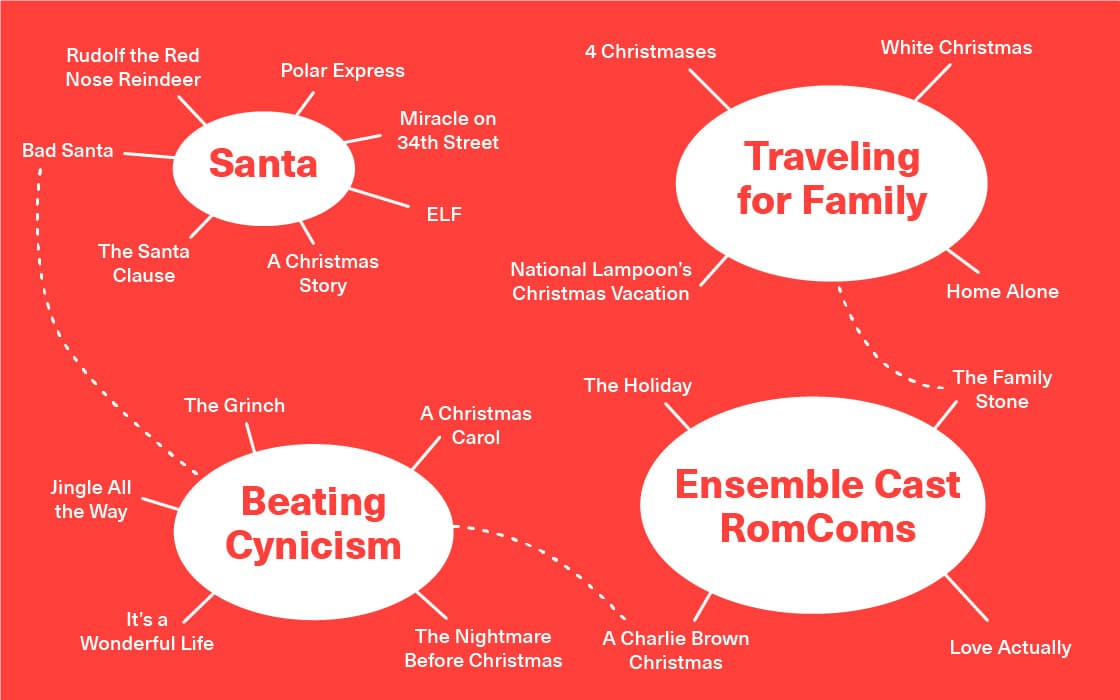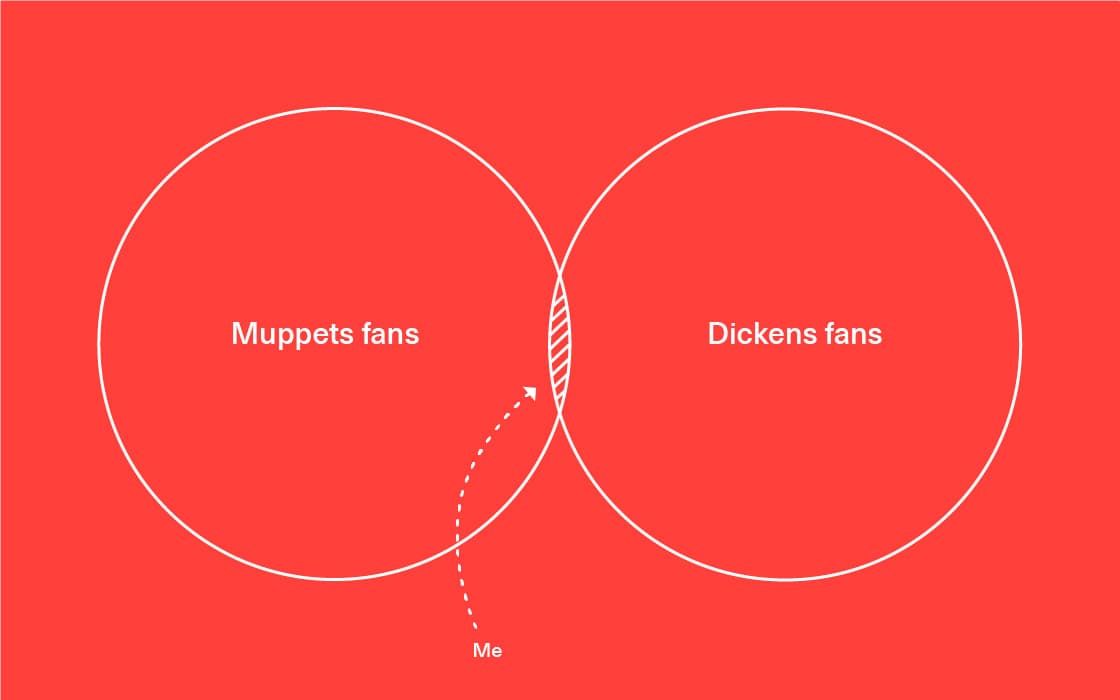I love Christmas, the month of December and everything ‘festive’. Like an elf made human whose only purpose is to throw glitter on every surface and shout carols in your face, I fundamentally believe this is the best time of the year.
From Dec 1st, I will try to get you to ignore your inner cynic (or in, my case, the thundering majority of colleagues around me) and be jolly.
But if you can’t be jolly, because you’re just too darn focused on getting some marketing done before the arbitrary deadline of 31st December, why not indulge in reflecting on how holiday movies teach us some great marketing lessons?
- A familiar formula = good UX
First, let’s establish the rules of this game because it’s not going to be as clear cut as our beloved ‘Let’s steal from…’ series.
To help us, I’ve invented a taxonomy of Christmas movie types that classifies holiday movies and lets us look at what there is to learn beyond the fake snow facade.

This is not an exhaustive list of all Christmas movies, it’s the movies I’ve seen and feel my expertise in the genre allows me to classify.
As far as scientific evidence goes, this concludes there is no such thing as a new holiday movie idea.
Reader: do not write in telling me I ‘forgot’ Die Hard. I didn’t.
So let’s define the four main story types:
Santa
There are versions where Santa is bad, versions where our hero helps Santa, versions where our hero becomes Santa, versions where we lose our belief in Santa…basically it’s a formula that starts with ‘So there’s this guy, and he has an encounter with Santa…’
Overcoming cynicism
This ranges from the light-hearted (Nightmare Before Christmas, The Grinch Who Stole Christmas) to the life-changing philosophical (A Christmas Carol, It’s a Wonderful Life). Our hero or anti-hero overcomes a long-held belief that being nice is rewarding and learns to give back. Sometimes with singing.
Travelling for family
Possibly the most relatable, these films capture the stress and anxiety of travelling and all the things that go wrong. There are obnoxious relatives, bad transportation options, dodgy weather: the makings of a Xanax commercial if ever there was one. But it’s Christmas so the hero ends up winning and nobody’s that upset they left a child at home in a huge house while burglars prowl the neighborhood.
Ensemble cast romcoms
Who doesn’t look more shaggable when there is mistletoe hanging in a doorway? Christmas movies are great for the romantic comedy formula and it works even better at scale. Why? Because increasing the cast means you increase the opportunities for ‘Will they? Won’t they?’ moments in front of a Christmas tree.
These four themes are not mutually exclusive, nor do they do anything other than give us a comforting hug of familiarity so we know what to expect.
The first lesson we can learn from holiday movies is really good UX. It’s a classic ‘Don’t make me think’ example that should govern all good B2B marketing. Tell the user what to expect before they get too comfortable. They can decide if it’s valuable for them to stick around and see it through.
Here are some other lessons (and carols):
2. The simplest concepts work the best.
A lot of B2B marketing fails to pass the ‘explain it to a child’ test. We think that our product/solution/services require complex language and add words when we should be cutting them.
This results in complex but – worse – completely forgettable marketing.
Look again at the diagram and you can probably summarize any of those films in a sentence. Haven’t seen Four Christmases? It’s about a couple that have to have four Christmases.
The Santa Clause? It’s about the legal contract that makes you Santa (and gets a pun in the title which is great fun).
Like all the best marketing, a killer short title cuts through a long-winded one. The case is made for the reader what kind of marketer you are by the confidence of your title.
And a warning: Something like Bad Santa is like BuzzFeed click-bait. It’ll drive traffic to your site but you’ll end up with a bounce-rate that will put you on the naughty list.
3) Parodies only work well if you have a well known brand.
There are some things that are really tempting in marketing – seeing a winning story/ad/parody elsewhere and thinking, we can do a version of that but, like, our way! And it will be funny!
Case in point: everyone everywhere has done a version of A Christmas Carol. But only a few are ones you’d willingly watch again.
The best, imho, is The Muppet Christmas Carol because the characters you know and love already crop up through the well-known plot. They have their own personalities they can layer on top of the characters they portray which gives them more flexibility than you’d get in a normal retelling. Plus – you get to expand your audience into fans of the original (Dickens fans) and fans of your brand content (Muppets fans) in a Venn diagram that may not otherwise exist.
In this case I suspect the diagram would look like this:

In other words, don’t consider a cover-version of a well-known (or worse, well-loved) campaign if you don’t have the clout to do something meaningful with it.
4. Make your audience see themselves as a hero
We all know that content works best when it targets a person with a specific challenge instead of appealing to a general audience.
Here at Velocity we have long been advocates of the ‘rant’ format where you bring your opinion to the table and rail against a problem. It’s an effective way to align yourself with something your prospect cares about as you’re immediately considered an ally. You’re both fighting from the same corner and you’re going to set them up to be a hero.
At Christmas time, there are as many things to rally against as there are to rally for. Here’s my shortlist of some of the best:
- National Lampoon’s Christmas Vacation rails against everything because we all feel a bit like Clark Griswald, only ever-so-slightly less dopey. Bickering in-laws, a failed turkey dinner, a truly disappointing Christmas company bonus: it’s all your Christmas frustrations in 97 minutes. We, too, would be disappointed in Jelly Of The Month Club.
- Discovering you were adopted is a pretty poignant moment in anyone’s life, but to find out you’re no longer magical is probably even tougher. While many of us haven’t lived this specific reality as it is played out in Elf I think it’s fair to say that we’ve universally been let down, as adults, by people we put faith in and that’s pretty crappy.
- A Christmas Story is less well known in the UK (go watch it, I’ll wait) but it brings us two levels of empathy:
- Firstly, and primarily, for Ralphie who wants a Red Ryder Range 200 Shot BB Gun more than anything in the world. We’ve all had that longing. We’ve all thought what better/cooler people we would be to have just one specific possession.
- Secondly, Ralphie’s parents deserve some empathy. Not only does their son want a deathtrap of a gift but a pack of dogs steal their dinner. Can you imagine? Is this your life? I’m so sorry. I’m sure there’s a support group for you.
5. There is a place for escapism
Sometimes we do marketing for the sheer joy of it, something that isn’t tied to lead generation or pipeline but because we had a great idea that was worthy of the effort. Like ‘Let’s make a video in a day’ or some other crazy idea you pursue.
It’s likely those are the projects you show off to your friends and colleagues, proud that you took the time to follow the passion.
This is really the lesson that all Christmas movies teach us: indulge in some silliness. Films we would be embarrassed to have seen any other time of the year are suddenly proud badges of honour. How many times have you seen Jingle All the Way? Really?
So what if the characters are a bit one-dimensional, the plot lines unrealistic, the fake snow super fake. It’s a great way to pass the time with mulled wine and drown out the aforementioned bickering in-laws.
So just like a Christmas miracle, you can find B2B Marketing wisdom in the most unlikely sources.
More from the Let’s Steal From series
Google Cardboard – the lowest tech hi-tech play you’ll ever see.
The Beatles – or should we say the B2Beatles…
The Simpsons – The most successful TV show of all time has lots to teach.
17th Century Explorers – And you thought marketers had a rough time convincing their audience.
The NBA – It was just basketball, then it took over the world.
Iceland air – How emphasising experience can make the middle of nowhere the destination.
The New York Times – You could do worse than stealing from the very best.
The MarTech Supergraphic – You too can build your own content powerhouse. Maybe.
The Democratic Mid-Term campaigns – Whatever you think about her politics, Alexandra Ocasio-Cortez sure is doing marketing right.
Follow The Frog – Making people feel bad is not the only way to raise money for charity.
Paths of Flight – Soothing plane videos from GE Aviation.
The Greatest Infographic Ever – From 1869. See it and weep.
Epic Split – Jean-Claude van Damme teams up with Volvo Trucks and they both come out of it very well.
Great First Lines of Novels – Incisive content from the likes of Orwell, Salinger and Garcia Marquez.
Rand Fishkin and Moz’s Whiteboard Fridays – Only one of the most successful and longest-running B2B content franchises ever made.
Airbnb City Guides – Crowdsourcing your way to content greatness.
TED Talks – SO much to steal here…

Enjoyed this article?
Take part in the discussion








Comments
There are no comments yet for this post. Why not be the first?